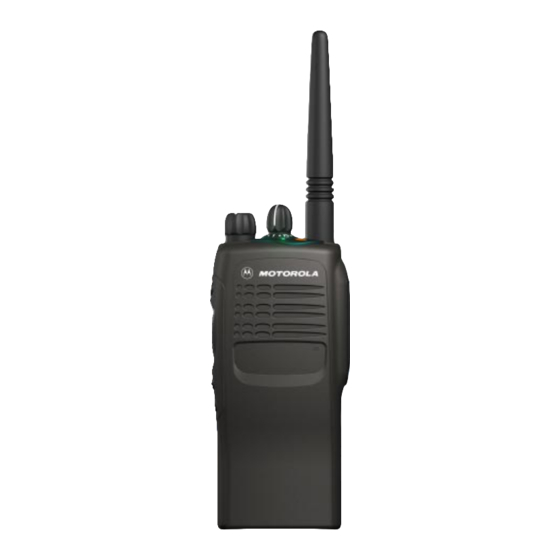Motorola HT750-LS Supplément au manuel d'entretien de base - Page 31
Parcourez en ligne ou téléchargez le pdf Supplément au manuel d'entretien de base pour {nom_de_la_catégorie} Motorola HT750-LS. Motorola HT750-LS 44 pages. Professional portable radio

Chapter 5
Radio Tuning, Programming, and Cloning
5.1
Cloning (Conventional and LTR)
Cloning is the same for both the Conventional and LTR radio. Cloning is the process of copying the
content of one radio (source radio) into another radio (target radio). Radio content refers to system-
type features such as frequency, squelch type options, trunking, etc.
Note: Cloning can be performed only on radios with identical model numbers and software options.
Radio functionality inherent in one radio cannot be cloned to another radio that does not contain the
same functionality. Tuning and alignment information are not transferable and are not affected by
cloning.
Signaling Identification Numbers (IDs) are duplicated in the cloning process. Unique IDs may be
assigned with the CPS.
Note: Unsuccessful cloning attempts will not damage the radio.
Procedure:
1. Turn source and target radios off.
2. Connect cloning cable to side connector of both radios.
3. Turn on target radio.
4. On source radio, simultaneously press 'side buttons 1 and 2', shown in Figure 5-3, then turn radio
on. Both radios produce a "clone-entry" tone and turn on their green LEDs. Display radios show
"Cloning To" (source radio) and "Program" (target radio).
5. Release both side buttons. The electronic transfer process begins and will take approximately one
to three minutes.
6. When cloning is completed, both radios reset themselves and turn their green LEDs off. The
source radio produces a "clone-exit" tone and displays "Clone Complete".
7. Turn both radios off.
8. Disconnect the cloning cable from both radios and turn them on for normal operation.
On/Off
Knob
Side Button 1
(programmable)
Side Button 2
(programmable)
Side Button 3
(programmable)
Figure 5-1. Radio Side Button Locations
5-1
